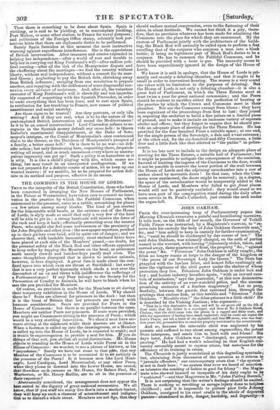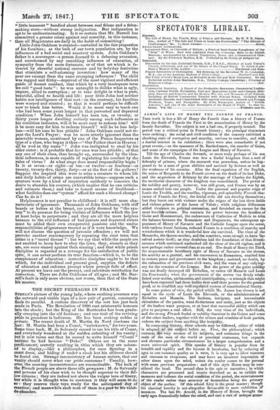JOHN OAKHAM.
FROM the ever-increasing heap of Parliamentary papers the Morning Chronicle excavates a painful and humiliating narrative. It tells how, on the 19th of last month, the Governor of Tothill Fields Prison was instructed, by a Magistrate's warrant, to "re, ceive into his custody the body of John Oakham therewith sent," &c., and " him safely to keep in custody for further examination," &c., "until-he should be discharged by due course of law." The said- John Oakham, was solemnly charged, on the oath of parties named in the warrant, with having "feloniously stolen taken, and carried away, three quarterns of flour, the property " &c., " against the peace" &c. " Felonious " John Oakham is safely caught ;.the felon no longer roams at large to the danger of the kingdom or "the peace of our Sovereign Lady the Queen." The State has grappled with the lawless felon, and honest folks exultingly ad. mire the vigilance of the civil power under the shelter of whose protection they live. Felonious John Oakhaw is under lock and key ; and honest industry breathessgain, " with an inward emo- tion of satisfaction," says the journalist, ".at this new demonstra- tion of the activity of an ever-watchful police, and -the uncom, promising sternness of a fearless magistracy." Let us peep, fearfully, between the guards that surround him, through the gratings that enclose him, at this terrible and "felonious' John Oakham. " Mirabile visu ! " the felon prisoner is a little child 1 He is described by the Visiting Justices; who represent- " That he is very diminutive in size, and will be six years old on the 6th of June next; that his father is a scavenger, and lives at No. 3 Oakham Street, Chelsea; that the child came into the prison in a ragged and filthy state, and with the appearance of having been much neglected ; that he could not repeat the Lord's Prayer, nor tell a letter of the alphabet; and that Ma sister who was four- teen years old, persuaded him to steal the property mentioned in the commitment.'
And so, because the miserable child was neglected by his parents and suffered to run about among ragamuffins, the potent State interposes, and sends him to herd with real felons I Six days later, John Oakham was " discharged, no prosecutor ap- pearing." He had had a week's schooling in that English uni- versity ostensibly meant to repress crime, but notorious for the efficiency of its training in crime.
The Chronicle is justly scandalized at this, degrading spectacle; but, abstaining from discussion of the question as it relates to "juvenile offenders," our contemporary avers that "the system" is not in fault here : " no system that ever we heard of sanction or tolerates the sending of babies to gaol for felony" : the Magis- trate who showed himself so incapable of his duty ought to be " cashiered "—and that Magistrate is Mr. "John Palfrey Burrell."
It is not surprising that the writer's feelings should be excited. There is nothing so revolting as savage injury done to helpless childhood ; and it is impossible to picture poor little Johnny Oakham, consigned to his cruel cradle in the abode of depraved parents—abandoned to dirt, danger, hardship, and depravity—a "little innocent" bandied about between real felons and a felon- making state—without strong indignation. But indignation is apt to be undiscriminating. Is it so certain that Mr. Burrell has committed a greater crime against real morality, in this instance, "' than all Magistrates are daily in the habit of committing? Little John Oakham is stunted—curtailed in the fair proportion- of his faculties ; as the bulk of our town population are, by the influences of a bad social and sanatory system. John Oakham's father is a scavenger—a person doomed to a debasing avocation, and unredeemed by any ennobling influence of education, of sympathy from the more fortunate, or of that art which is fa- voured by cheerful national customs and by holyday festivities that stimulate a self-adorning invention: how many of the poor are exempt from the same cramping influences The child was ragged and filthy—deprived of the most vigilant and efficient guide of decent conduct, that which by a very inadequate term we call "good taste " : he was untaught to dislike what is ugly, impure, allied to corruption ; or to take delight in what is pure, beautiful, allied to health and life: poor little John had neither habits nor intelligence of that sort: on the contrary, his faculties were warped and stunted; so that it would perhaps be difficult now to teach him better. Would it be more easy to teach one who had been some years longer in that perverted and depraved condition ? When John himself has been ten, or twenty, or thirty years longer dwelling entirely among such influences as his condition indicates, will it be more easy to redeem him? will it be more easy for him to redeem himself ? will he be less help- less—will his case be less pitiable ? John Oakham could not re- peat the Lord's Prayer : was he more utterly ignorant than the miserable woman, mentioned by one of the Prison Inspectors as type of a class, who began it thus—" Our Father chart in Heaven ! all be wed in thy name " ? John was instigated to steal by his elder sister : is it probable that her case was less pitiable ; or that any one of their class, thus brought up, surrounded by the iden- tical influences, is more capable of regulating his conduct by the rules of virtue ? At what stage does moral responsibility begin Is it at seven—or eight—or ten—or twelve—or fourteen—or twenty, twenty-five, thirty, forty—or at the foot of the gallows? Suppose the inspired idea were to seize a creature to whom life and daily habits of crime are convertible terms—suppose such a creature were by a kind of inspiration suddenly to conceive the desire to abandon his courses, (which implies that he can criticise and estimate them,) and take to honest means of livelihood— what facilities does our "system" afford for such a blessed change? Can he do it f Helplessness is not peculiar to childhood : it is still more cha- racteristic of ignorance. Thousands of John Oakhams, with stiff beards or babies at the breast, are yearly doomed by "the sys- tem " 'to do penance for being victims of influences which the law at least helps to perpetuate ; and they are all the more helpless because to the evil influence of bad parents and depraved sisters must be added their own exasperated passions and the undue responsibilities of ignorance treated as if it were knowledge. We will not discuss the question of juvenile offenders ; we will not provoke another contemporary by repeating the cant term that crime is a "moral disease ' : but we say that while the people are not enabled to learn how to obey the laws, they, sinners as they are, are more sinned against than sinning ; and that while prison discipline is regarded as a revenge for the satisfaction of public spite, it can never perform its true function—which is, to be the complement of education : corrective discipline ought to be that which, for the individual and general good, supplies the defects of education and enforces precept where precept fails of effect. At present we leave out the precept, and substitute retribution for
correction. There are John Oakhams of all ages; Mr. Bur- rell's fault is only more obvious, not worse, than tat of the State his master,



























 Previous page
Previous page